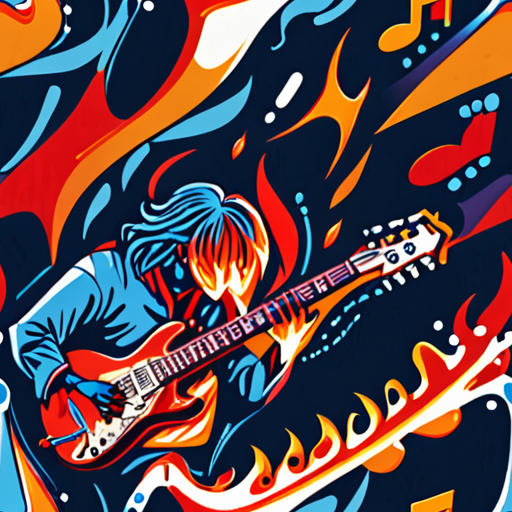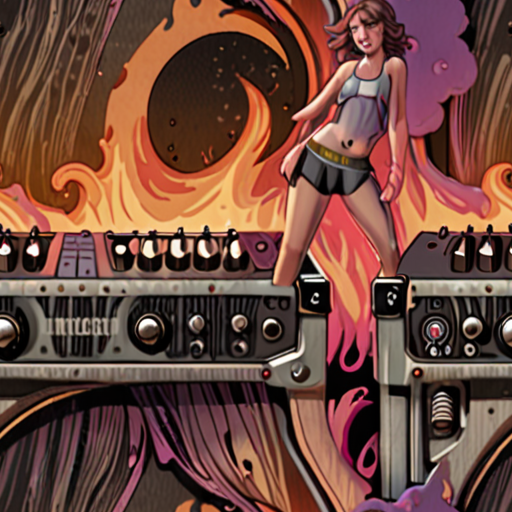The unbridled spirit of rock culture and lifestyle has captivated audiences worldwide, transcending generations and geographical boundaries. At its core, rock culture embodies a sense of rebellion, nonconformity, and individuality, reflecting the essence of rock music’s roots in blues, country, and folk traditions. As we delve into the world of rock culture and lifestyle, we’ll explore its evolution, key elements, and profound impact on society, fashion, art, and even our brains.

The Culture of Rock
The culture of rock is deeply rooted in rebellion, freedom, and nonconformity, shaping the way people dress, talk, and listen to music.
-
Rebellion and Nonconformity
Rock music has always been associated with a rebellious attitude, challenging societal norms and expectations.
- We see this in the iconic images of Jimi Hendrix setting his guitar on fire or The Sex Pistols’ anti-establishment lyrics.
- This attitude continues today, with many rock bands embracing individuality and self-expression.
-
Freedom and Self-Expression
Rock music has long been a platform for artists to express themselves freely, pushing boundaries and exploring new sounds.
- From the psychedelic rock of Pink Floyd to the punk rock of The Clash, rock music has always been about experimentation and innovation.
- Today, we see this in the rise of indie rock and alternative genres, which continue to push the boundaries of what rock music can be.
-
Dress and Style
Rock fashion has always been about expressing oneself through clothing and style.
- From leather jackets to ripped jeans, rock fashion has become a staple of popular culture.
- Many rock bands have made fashion statements through their music videos, live performances, and album artwork.
As a community, rock fans share a deep passion for music, fashion, and self-expression.
We celebrate our differences and individuality, coming together to support our favorite bands and artists.
At Oedipus Band, we’re proud to be part of this vibrant community, sharing our love of rock music with fans around the world.
Whether you’re a seasoned rocker or just discovering the genre, we invite you to join us on this journey of self-expression and musical exploration.
Let’s keep rocking!
Why Rock Music Was So Controversial
Rock music has been a staple of popular culture for decades, but its early days were marked by controversy and backlash.
- The older generation saw rock music as a threat to traditional values and social norms.
- Churches condemned rock music as “Satan’s music,” citing its perceived association with rebellion and immorality.
- Many middle-class whites viewed rock music as “tasteless” due to its origins among the lower classes and a segregated ethnic group.
These negative attitudes towards rock music were fueled by misconceptions and a lack of understanding about the genre.
- Origins of Rock Music: Rock music emerged in the 1950s as a fusion of blues, country, and rhythm and blues.
- Early Adopters: Rock music was initially adopted by young people from working-class backgrounds who were looking for a new sound and a sense of identity.
- Cultural Significance: Rock music became a powerful symbol of youth culture and rebellion against mainstream values.
Despite the controversy surrounding it, rock music went on to become a major force in popular culture, influencing countless artists and shaping the course of musical history.
Rock Music Today
Fast forward to today, and rock music remains a beloved genre around the world.
- Diverse Range of Styles: Rock music encompasses a diverse range of styles, from classic rock to punk, metal, and indie rock.
- Influence on Popular Culture: Rock music continues to influence popular culture, inspiring films, literature, and art.
- Timeless Appeal: Despite the passing of time, rock music remains a timeless and enduring part of our cultural heritage.
Conclusion
Rock music may have started out as a source of controversy, but it has gone on to become a beloved and enduring part of our cultural landscape.

How Rock Music Has Influenced Society
Rock music has had a profound impact on society, shaping cultural norms, influencing fashion, and reflecting the values and attitudes of its time.
-
Cultural Significance
Rock music emerged in the 1950s as a fusion of blues, country, and rhythm and blues, quickly gaining popularity among young people who felt disconnected from mainstream culture.
The genre’s raw energy, rebellious spirit, and emotional intensity resonated with audiences seeking authenticity and self-expression.
As rock music evolved, it incorporated various styles, from psychedelic rock to punk and heavy metal, each reflecting the era’s social and political climate.
-
Fashion and Style
Rock music’s influence on fashion was significant, with iconic looks like leather jackets, ripped jeans, and bold hairstyles becoming synonymous with the genre.
Designers like Vivienne Westwood and Malcolm McLaren capitalized on the trend, creating clothing lines that reflected the DIY ethos and anti-establishment sentiment of punk rock.
Today, rock-inspired fashion continues to influence high-end designers, with luxury brands incorporating edgy, avant-garde elements into their collections.
-
Social Attitudes and Language
Rock music played a crucial role in shaping social attitudes, particularly during the 1960s and 1970s, when it addressed issues like civil rights, war, and environmentalism.
The genre’s lyrics often challenged societal norms, encouraging listeners to question authority and think critically about the world around them.
Rock music’s influence on language is equally significant, with terms like “rockstar,” “headbanger,” and “groupie” entering the mainstream lexicon.
-
Impact on Youth Culture
Rock music has long been a driving force behind youth culture, providing a platform for self-expression and identity formation.
The genre’s emphasis on live performances, community building, and DIY ethics has inspired countless young people to pursue careers in music, art, and activism.
From punk rock’s anti-establishment ethos to indie rock’s lo-fi aesthetic, rock music continues to shape the tastes, values, and aspirations of young people worldwide.
-
Legacy and Influence
Rock music’s influence extends far beyond its own genre, with its sonic experimentation, lyrical themes, and cultural significance inspiring countless other musical styles.
From hip-hop to electronic dance music, rock’s legacy can be heard in the beats, melodies, and attitudes of contemporary genres.
As rock music continues to evolve, its impact on society remains profound, shaping cultural norms, influencing fashion, and reflecting the values and attitudes of our time.

The Main Message of Rock and Roll
Rock and roll is a form of music that embodies rebellion, passion, and raw emotion It expresses the feelings of frustration, anger, and desire in a way that resonates deeply with listeners The history of this genre dates back to the 1950s, born out of a fusion of blues, gospel music, and country.
- Rebellion and Nonconformity: Rock and roll has always been associated with a sense of rebellion against societal norms and expectations It celebrates individuality and nonconformity, encouraging listeners to challenge authority and forge their own paths.
- Passion and Energy: Rock music is characterized by its high-energy beats, powerful guitar riffs, and emotive vocals These elements combine to create a sonic landscape that is both intense and cathartic.
- Emotional Expression: Rock and roll allows artists to express themselves freely, exploring themes of love, heartbreak, and social justice through their lyrics and performances This emotional authenticity has helped to establish rock music as a powerful force in popular culture.
As a community-driven platform, we at Oedipus Band believe that rock music has the power to bring people together, fostering a sense of connection and shared experience Our mission is to celebrate the diversity and creativity of rock music, while promoting the values of inclusivity, empathy, and self-expression.
We’re proud to feature a wide range of talented artists and bands on our platform, each with their unique perspective and style Whether you’re a seasoned rocker or just discovering the genre, we invite you to join us on this journey of musical exploration and discovery.
For more information on rock music and its rich history, check out our Rock Music History section, which delves into the genre’s evolution and impact on popular culture.
Additionally, be sure to explore our Music Reviews section, where we showcase the latest releases and offer in-depth analysis of the artists and albums that matter most to our community.
At Oedipus Band, we’re committed to providing a platform that celebrates the beauty and diversity of rock music Join us today and discover the power of rock and roll for yourself!
How Does Rock Affect the Brain?
Rock music has long been associated with energy, excitement, and a sense of rebellion, but did you know that it can also have a profound impact on our brains? In this article, we’ll explore the ways in which rock affects the brain, from reducing stress and anxiety to boosting creativity and mood.
- The Science Behind Rock Music
- The Power of Rhythm and Melody
- The Impact of Lyrics on Our Brains
- The Role of Rock Music in Creativity and Inspiration
-
Conclusion
As we’ve seen, rock music has a profound impact on our brains, from reducing stress and anxiety to boosting creativity and mood. Whether you’re a die-hard fan or just a casual listener, there’s no denying the power of rock music to transform our minds and lives.
Research has shown that listening to rock music can stimulate the release of neurotransmitters such as dopamine, serotonin, and endorphins, which play a crucial role in regulating our emotions and mood. These chemicals can help to reduce stress and anxiety, promote feelings of happiness and relaxation, and even alleviate symptoms of depression.
The rhythm and melody of rock music can also have a profound impact on our brains. Studies have shown that listening to music with a strong beat can increase our heart rate and blood pressure, while also releasing endorphins and other feel-good chemicals. This can lead to improved mood, reduced stress, and increased energy levels.
The lyrics of rock songs can also have a significant impact on our brains. Research has shown that listening to music with meaningful and relatable lyrics can stimulate the release of dopamine and other neurotransmitters, leading to improved mood and reduced stress. Additionally, the emotional connection we form with the lyrics can also lead to increased empathy and understanding.
Rock music has long been associated with creativity and inspiration, and for good reason. The genre’s emphasis on experimentation, innovation, and self-expression can stimulate our brains and encourage us to think outside the box. Listening to rock music can also inspire us to take risks, challenge ourselves, and push beyond our limits.

What Does Rock and Roll Life Mean?
When someone is described as living a rock and roll life, it means they embody the spirit of freedom, creativity, and nonconformity that defines the rock music genre.
- They live life on their own terms, prioritizing passion and excitement over traditional norms and expectations.
- Their lives are often marked by spontaneity, adventure, and a willingness to take risks.
- Music plays a central role in their existence, serving as a constant source of inspiration and motivation.
The Characteristics of a Rock and Roll Lifestyle
A rock and roll lifestyle is characterized by several key traits:
- Nonconformity**: They reject mainstream values and societal expectations, embracing individuality and self-expression.
- Creativity**: They nurture their artistic side, whether through music, art, writing, or other forms of creative expression.
- Spontaneity**: They live in the moment, taking advantage of opportunities as they arise and embracing the unknown.
- Passion**: They pursue their passions with unwavering dedication and enthusiasm.
The Benefits of Embracing a Rock and Roll Lifestyle
Living a rock and roll life can bring numerous benefits, including:
- Increased creativity**: By embracing their artistic side, individuals can tap into their full potential and explore new ideas.
- Greater confidence**: By living life on their own terms, people can develop a sense of self-assurance and self-trust.
- Deeper connections**: By pursuing their passions, individuals can form meaningful relationships with like-minded others.
Conclusion
Living a rock and roll life is about embracing the spirit of freedom, creativity, and nonconformity that defines the rock music genre. By rejecting mainstream values and societal expectations, nurturing their artistic side, living in the moment, and pursuing their passions, individuals can unlock their full potential and lead a more authentic, fulfilling life.
0 Comments